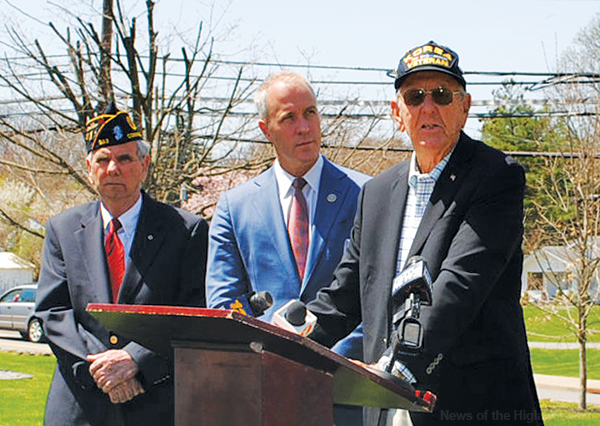

Supervisor Richard Randazzo and Congressman Sean Patrick Maloney look on as Ray Mellin speaks Tuesday afternoon. Maloney visited Cornwall to announce new legislation that would eliminate the three-month limit on combat pay eligibility for Korean War POWs.
After working alongside Korean War veteran and prisoner of war (POW) Corporal Raymond Mellin of Cornwall-on-Hudson, Representative Sean Patrick Maloney (NY-18) announced the Never Forgotten Korean War POW Act to retroactively eliminate a unique and arbitrary three-month limit on combat pay eligibility for Korean War POWs. The Combat Duty Pay Act of 1952 established combat pay for the United States military, but conditions of the law did not allow Korean War POWs to be paid for more than three months of their time being held in enemy prisons.
“Corporal Ray Mellin was a POW for 37 months, but his time in an enemy prison wasn’t recognized in the way it should have been, and this is about a lot more than just the money,” said Rep. Maloney. “The Korean War is often called “the forgotten war,” but my bill aims to ensure we don’t forget those who served and sacrificed – sometimes the little things say a lot, and I’m hoping my bill will honor these veterans in the way they deserve to be honored.”
“My fervent wish is to have this injustice made right, not for the monetary reasons, but to honor the remaining few Korean War POWs,” said Korean War POW Corporal Raymond Mellin. “I’m very thrilled that the Congressman is pursuing this.”
“Corporal Raymond Mellin is a hero and deserves to be fairly compensated for his time as a POW,” said New York State Assemblyman James Skoufis. “I’m grateful for Congressman Maloney’s focus on making sure veterans like Corporal Mellin get their long-overdue payment for their service.”
Cornwall Supervisor Richard Randazzo helped bring the issue to the Congressman’s attention. “When I first heard from Ray,” he said, “it was clear to me that steps had to be taken to acknowledge the sacrifices the POWs had made and the conditions they endured. The legislation proposed by the Congressman will finally give these veterans the recognition they have earned.
“Sadly, it often takes the actions of elected officials to obtain the fair and just compensation due our veterans,” said Director of the Orange County Veterans Service Agency Christian Farrell. “I commend Congressman Maloney for taking up the fight to right a wrong that took place nearly 70 years ago.”
In addressing the issue of underpayment, the Congressman considered Corporal Raymond Mellin a compelling example. The corporal was captured during the first encounter of the war and remained in captivity for 37 months. Yet only got 3 months of combat pay.
The Combat Duty Pay Act of 1952 established expanded payment parameters for members of the armed services who met certain criteria. Although POWs from the Korean War did qualify for combat pay, the law instituted a three-month limit on their eligibility. The Never Forgotten Korean War POW Act would simply strike the language which includes the limit and adjust the rate of pay to be consistent with inflation.
